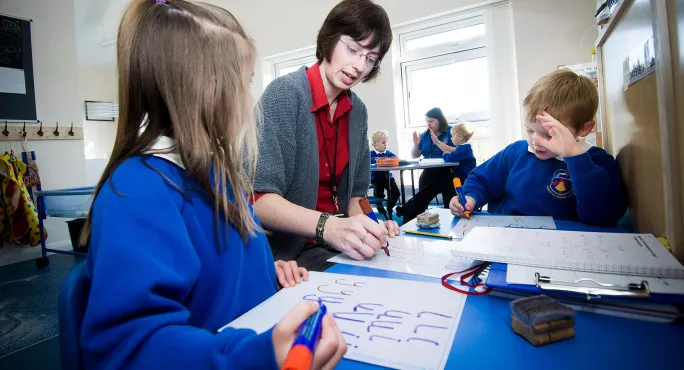- Home
- Just 136 teachers failed induction in last ten years
Just 136 teachers failed induction in last ten years

Just 136 trainee teachers out of more than 300,000 have failed their induction year in the past ten years, according to new figures obtained by Tes.
Sir Michael Wilshaw, the former chief inspector, said that the tiny number of failures was a function of the recruitment and retention crisis and could mean there were people in the profession who shouldn’t be.
And the figures, obtained through Freedom of Information requests, also show the declining number of teachers undergoing induction - with 28,260 people passing their induction year in 2017-18, fewer than at any time in the past ten years.
Quick read: Teacher retention fears over two-year NQT induction
What to expect: Your NQT induction
Analysis: How the Early Career Framework has won hearts and minds
In order to teach as a qualified teacher in a maintained school, newly-qualified teachers (NQTs) must currently complete an induction year in a school.
The induction year comes after a trainee has completed their initial training and gained qualified teacher status (QTS).
The headteacher of the school where the induction year is being undertaken makes a recommendation about whether the NQT’s performance is satisfactory and the assessment is checked by an “appropriate body” such as a local authority, which makes the final decision.
In total, just 0.05 per cent of teachers initially failed their induction year in the past ten years: 164 out of 303,753 teachers.
Of those 164 who failed, 42 lodged appeals and 28 appeals were allowed, meaning that just 136 teachers failed after appeal.
“It’s clearly linked to the critical shortage of teachers,” Sir Michael said. “When you have a recruitment crisis and a shortage of teachers, headteachers have to take people or keep people they would not normally want to, in a more healthy market.
“Headteachers err on the side of generosity when in a recruitment and retention crisis and keep average people when perhaps they shouldn’t.
“The [failure rate] is a very small number, incredibly small. I can’t believe that they are all people who should progress onwards.”
The figures show that in 2008-09, there were 30,767 teachers who passed their induction year and 23 who failed - five appeals were received and all appeals were allowed.
In 2018-19, the figures show 28,260 teachers passed their induction year and 12 were failed. Four appeals were received, two appeals were allowed and two were dismissed.
The Department for Education has previously raised concerns about the different approaches of the appropriate bodies which sign off the induction year.
Gareth Conyard, deputy director at the DfE, said last year that there was something that did not feel “quite right” about the system and that there were “significant variations” in the way the process was handled - with some schools finding the appropriate body simply “rubber-stamped” the process while others were more supportive.
Teacher training providers say that the small failure rate by the end of induction is a reflection of their work in selecting and training the right candidates, but agree the process could be better.
“Initial teacher training is the gateway to the profession,” Emma Hollis, executive director of the National Association of School-Based Teacher Trainers (NASBTT), said. “The fact that so few people fail their NQT year is a testament that we have done our job properly.
“But the process needs to be strengthened, not because more people ‘should be’ failing, but because the system is failing them. Unlike ITT, which comes under external scrutiny, appropriate bodies have very little oversight…If we are saying these are the bodies which are approving the NQT induction process - which is being strengthened with the early career framework - then we need to make sure the early career framework is being done to an adequate standard and there does need to be more formal oversight.”
The government has said it will extend the induction year to two years, underpinned by the early career framework, from September 2021, although some areas will be part of an early roll-out in September 2020.
The two-year induction year is part of the government’s recruitment and retention strategy and is aimed at reducing the number of drop-outs by extending the period in which trainees get a reduced timetable and mentoring support.
There is no legal requirement to pass an induction year to work solely in the independent sector, an academy or free school.
A DfE spokesperson said: “There are no great schools without great teachers - and we want all of our teachers to be of a high standard. Newly qualified teachers must pass their induction period, which is signed off by appropriate bodies such as local authorities or other registered organisations to become a fully qualified teacher.
“Headteachers are responsible for making a recommendation whether a teacher has passed their NQT year and a final decision is made by the appropriate body.
“We have committed to strengthening the appropriate body function and we are currently engaging with the sector to develop proposals in this area.”
- Tes Institute - which is owned by the same parent company as Tes - working with Benfleet TSA is an appropriate body
Keep reading for just £1 per month
You've reached your limit of free articles this month. Subscribe for £1 per month for three months and get:
- Unlimited access to all Tes magazine content
- Exclusive subscriber-only stories
- Award-winning email newsletters



